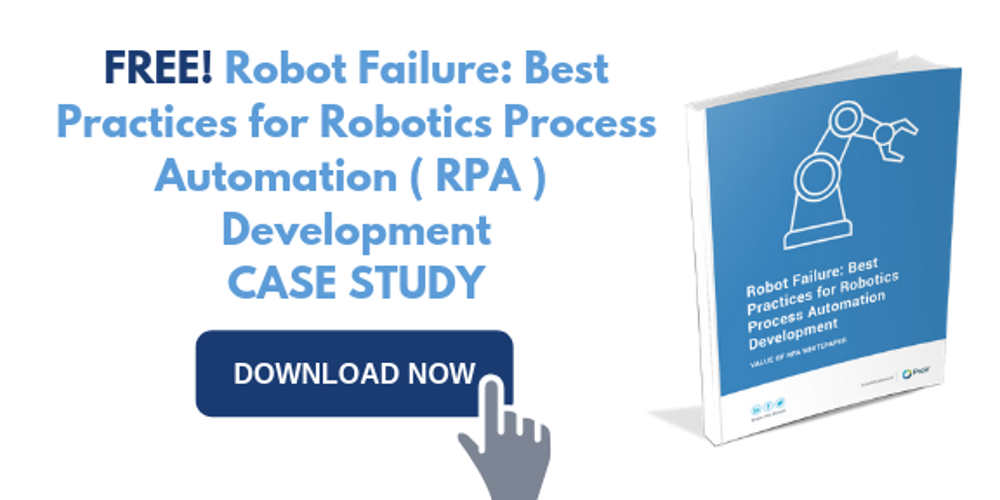Robotic process automation (RPA) has turned into one of the fastest growing enterprise technologies of recent years. According to a survey by HfS Research, the global market for RPA software and services grew by 63% between 2016/ 17. The report further stated that the global market for RPA is expected to grow to $1.2 billion by 2021 at a compound annual growth rate (CAGR) of 36%.
Although still in its infancy, the promise of a virtual workforce where a software bot or a virtual worker mimics human behaviour by automating repetitive activities without needing further intervention or assistance has seen a drastic increase in RPA adoption.
RPA Adoption on the Rise
According to a survey by Forrester, 45% of all business leaders in the US, Europe and Japan indicated that they have implemented some form of RPA solutions, while another 30% are planning to get started with RPA within the next year.
CFOs and CEOs today are wising up to robotics process automation software benefits that reduce labour costs, improve process consistency and minimize redundancies. Industries that have to deal with a high amount of data entry and form filling processes have led the way in terms of RPA adoption.
The banking and insurance industries have led the way with RPA implementation, with some interest shown from other industries including Finance, Accounting, and Human Resource functions.
RPA Hype: Mixed Messages
A key player in RPA, McKinsey published a blog on December 2016 titled “The next acronym you need to know about RPA”, describing development potential in business automation that may offer potential ROI of 30-200% within the first year. Less than 6 months later, they published another article called “Burned by the bots: Why robotic automation is stumbling” that talked about the problems in RPA adoption.
Did the reality of RPA change in those 6 months? What is real, and what is hype?
A few years ago, the London Daily Mail, published an article called “Is 2014 the year your job will be taken by a robot?” Articles like these, has often led to RPA being associated with mass displacement of human resources and hysteria.
Certainly, robotic process automation (RPA) has advanced over the past few years, but RPA experts see a different reality. While RPA technology can be rapidly implemented and reduces the need for repetitive human effort, many distinct limitations in RPA capability remain to the types of work it can be applied on and human checks are still required at pivotal junctions.
When Should You Choose RPA Automation?
While there have been some success stories where RPA technology has delivered significant operational efficiencies and cost savings to organizations, but for most companies looking to automate processes for traditional support operations like finance & accounting, HR, supply chain management, IT, etc., the progress and benefits of RPA are often less dramatic.
The best bots or service robots eliminate human intervention and interactions through rule-based automation by leveraging artificial intelligence (AI) and machine learning (ML) concepts.
Before implementing RPA, you should focus on reducing the non-value addition processes and optimizing workflows. Next, you look to standardize as many processes within a specific business function as possible. If your company has already leveraged methodologies like Lean and Six Sigma, to bring in organizational efficiencies and boost agility, you are better suited to implementing RPA.
Finding the Right Partner to Deploy RPA
Many organizations that jumped on the hype bandwagon are struggling with implementing RPA processes. Implementations take longer and are more complicated than most vendors promise.
Implementing RPA into your day-to-day operations requires a change in the roles of your employees, and proper guidance through change management. In most scenarios, RPA will automate few tasks within a process, but not inevitably the entire process. In practice, it can make human workers more productive and efficient, but not always replace them.
Finding resources to design, develop, implement and support RPA is a challenge, especially for small and medium sized enterprises who cannot afford to invest lump-sum amounts into their efforts. Proper guidance and expertise is necessary for companies to reap full benefits of their deployment. Outsourcing your RPA needs to an expert, can be a lucrative option to consider. MSPs with proper RPA expertise can help you get started with RPA today.
ProV International Inc. are a global IT services delivery organization committed to providing high-end services that helps companies improve service delivery by connecting their existing systems to robot-aware technologies, that increase speed and efficiency and pave the way for your digital transformation. Our RPA services include:
- RPA Strategy
- RPA Proof of Value for Selected Opportunities
- RPA Business Case Development
- RPA Production Rollout
- RPA Centre of Excellence
- RPA Managed Services
To learn more about how ProV can help streamline your processes with RPA, or for pricing details, drop a comment below or contact us today.

